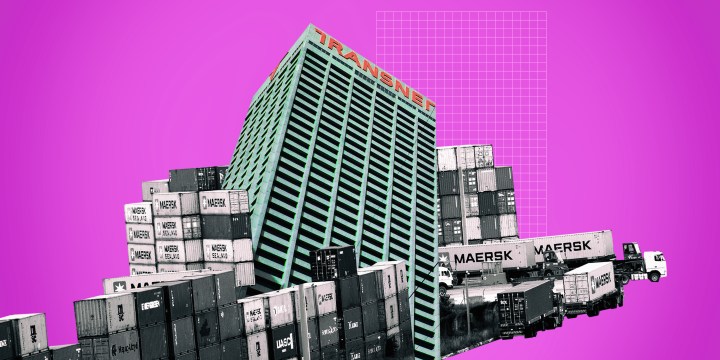BUSINESS REFLECTION
After the Bell: Beyond poor performance and astounding debt, Transnet has another often-overlooked crisis

This crisis has been identified by the Auditor-General, which by law has to audit the financial results of Transnet for their veracity and reliability.
By now, the problems at Transnet are well documented.
Its rail operations, which are a crucial cog in SA’s economy as they ferry most of the iron ore and coal to countries around the world, are not reliable. Its trains often face delays or do not move at all, mainly because of cable theft, vandalism and the state-owned enterprise’s (SOE’s) poor management of the system.
Ports run by Transnet are equally in a mess and are ranked among the world’s worst as they are miles behind in terms of efficiency, container loading and waiting times.
Then there are the numbers themselves, which are horrific.
Transnet swung from a profit of R5-billion to a loss of R5.7-billion for the year ended March 2023. And while the attention has been on Eskom’s debt problems, Transnet has its own. Its debt has reached R130.1-billion, with the SOE now paying R1-billion in interest every month on this debt.
In the investment community, Transnet is increasingly viewed as being risky to lend money to because it is burdened by debt expenses. This can be seen in its cash interest cover (a measure of a company’s ability to pay interest that is due on outstanding debt), which is sitting at 2.1 times, a decline from 2.6 times a year ago. This means that Transnet’s ability to meet interest payments on debt is increasingly questionable.
Ghastly scenario
Transnet’s debt situation almost came to a head in July last year when it came close to defaulting on a 10-year $1-billion (about R17-billion at the time) international bond, which could have triggered other lenders to immediately demand repayments and placed the government (or taxpayers) in a position to bail out the SOE. This ghastly scenario was avoided as Transnet renegotiated repayment terms with lenders and raised more debt to settle outstanding payments — an expensive exercise that worsens the SOE’s debt position, considering that interest rates are higher.
But beyond Transnet’s financial situation, there is even a bigger governance crisis unfolding behind the scenes. This crisis has been identified by the Auditor-General, which by law has to audit the financial results of Transnet for their veracity and reliability. And the Auditor-General’s findings, included in Transet’s latest financial statements, are damning.
Transnet’s compliance with auditing and financial reporting standards is weak, more so on the SOE’s reported irregular, fruitless and wasteful expenditure, which involves expenditure that didn’t follow laws or operational policies (deliberately or accidentally) and could have been avoided if reasonable care was exercised.
“There was inadequate oversight responsibility regarding financial reporting, compliance and related internal controls to ensure that compliance requirements are met in order to prevent irregular, fruitless and wasteful expenditure … The action plan developed by the leadership to address actual root causes for material findings was not effective, as repeat findings were raised during the audit process,” the Auditor-General found.
In other words, Transnet’s record-keeping and management are shoddy. In its annual report, Transnet disclosed an increase in irregular expenditure from R1.1-billion in 2022 to R2.3-billion in 2023 (including previously identified and confirmed expenditure), mainly relating to the awarding and evaluation of tenders.
Meanwhile, fruitless and wasteful expenditure increased by R4-million to reach R16-million. (Some of these numbers swell when including expenditure currently under assessment or investigation into whether it is flawed).
But not even the Auditor-General could confirm the accuracy of these numbers or express an audit opinion because Transnet’s record-keeping and reporting mechanisms are a mess. So, the public is none the wiser on this matter.
This is worrying because Transnet was recently granted a three-year exemption from the dreaded Public Finance Management Act (PFMA) so that it does not have to include irregular, fruitless and wasteful expenditure in its annual financial statements. But such expenditure can be disclosed in the annual report. This exemption will run from March 2022 to March 2024.
Transnet CEO Portia Derby argued that granting such exemptions would help the SOE be on a level playing field with private sector companies, which are not subjected to the PFMA. Derby said the PFMA was cumbersome as SOEs were required to continuously include previously identified irregular, fruitless and wasteful expenditure in their latest financial statements — even if they had taken corrective and remedial actions.
Transnet’s approved exemption was the same one that was offered to Eskom but was rescinded by Treasury because critics across the political and civil society spectrum argued that the exemption could be used by the power utility’s management and board to hide wrongdoing.
Good governance requirements expect Transnet’s management and audit committee on the board (which hasn’t had a permanent chair since March) to have already improved reporting systems as the SOE is now in year two of the PFMA exemption. It is seriously worrying that Transnet, which was a key site of State Capture and is an SOE attempting to rehabilitate itself from the harmful past, has been found wanting on its financial and reporting mechanisms.
To remedy this, Transnet CFO Nonkululeko Dlamini talked about automating procurement processes so that errors can be detected in real time, and the constant training of employees on PFMA requirements. These measures are noble but will take time to implement and perfect.
For now, perhaps Transnet’s management is not fit for purpose. After all, the Auditor-General also found that management had achieved only 26.3% (from 38.6% in 2022) of its self-imposed annual performance targets, which included reducing container turnaround times at ports and lowering security incidents on its rail network. DM



















 Become an Insider
Become an Insider
Comments - Please login in order to comment.